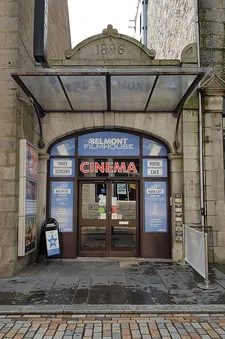 |
| The Belmont Filmhouse in Aberdeen where Mental Health in Movies have run screenings Photo: Watty62 |
Why do you go to see films? For most people, it’s first and foremost about entertainment, but films can also be educational, they can transport us to far off places and they can change our perspectives on the world around us. Mental Health In Movies is a project which aims to use this to improve people’s lives. It was started by Dan Warrender and Scott Macpherson, two mental health nurses from Aberdeen who wanted to find a new way of connecting with their local community and helping people at the same time as sharing an enjoyable experience. They were happy to talk about how it developed and what they learned along the way.
Readers should be aware that this interview touches on some quite sensitive topics, but both Dan and Scott felt it was important to be open about their personal experiences, and want to help get rid of the stigma which too often gets in the way of conversations which have the potential to benefit us all.
“Dan and I started working together in 2014,” says Scott. “We always talk about film, and we have opinions about stuff. And we're aware, obviously, that other people do and other people can feel comfortable talking about their opinions on film. They don’t leave that to people who are experts on film. They feel like they’re allowed to have opinions and share them. So in 2016, for Mental Health Awareness Week, we were aware that the union wasn't really doing anything much to get people talking about mental health. We just came up with this idea that we could use film as a platform for discussion.
“They’re all films that show a kind of human experience. Quite simply, everyone's always having a mental health experience. But we're also aware that sometimes when people use the words ‘mental health’, they're really talking about mental ill health. And we wanted to try and kind of break down some of that stigma around it and just normalise conversations. So we thought, we're using this normal thing that people are allowed to feel confident to have opinions about, as a platform for talking about this subject that's often taboo and people don't feel is any of their business and don't feel like they really have a right to be involved with and talk about, or that’s seen as shameful. It's something that could be a useful way of encouraging conversations.”
So how did this turn into the project that they run now?
“We ran Mental Health Movie Monthly for four or five years until we were interrupted by the pandemic,” says Dan. “We had monthly in person showings and that face to face interaction was really important to us. Since then, we have tried to adopt and we've had a couple of conversations over Twitter but it’s difficult to have that kind of spontaneous conversation via social media. So we decided to launch a podcast under Mental Health and Movies as part of our way forward, and that’s really broadened our sphere of influence and the people that we can reach. Obviously, we were always limited to people that could attend in the in the local area. Having conversations about mental health is something that society needs rather than just that kind of local area, so that's brilliant. We now have a wider audience so I hope that people will listen to that and as a result, will look at film differently.
 |
| Planes, Trains And Automobiles |
“We've recently started doing our live events again, as well. We did one recently showing Planes, Trains And Automobiles, at the Belmont cinema in Aberdeen, to a small audience. It's great to be doing things in person again, because while me and Scott can always watch a film, we can always find a million things to talk about, what an audience does is allows us to open up and say, ‘What do you guys think? What are your ideas?’ and then we respond to that. I think having the public there is really, really important. So what we’re doing is podcasting so that we can broaden our audience – so that we're getting people across the world, to be honest – but we still really believe in that in person experience of watching the film and then talking about it together.”
I suggest that, from my perspective, the project seems to be doing multiple things: improving people’s general awareness, helping people who are mentally unwell and giving people skills which might help to stop them becoming unwell in the first place.
“Yeah, absolutely,” says Scott. “When we were doing our monthly shows that was something that we talked about, what our aim is. We talk about mental health all the time and we talked about film all the time as well, and we want to encourage conversations, to encourage people to think about mental health as belonging to them, as something that they care about that is important to them and that they can have opinions on. So yeah, I think that was one of our key aims, to try and make it available to everyone and encourage people to come along and see it as something that was useful to them, to maybe change their perspective a little bit and think about people's mental health experiences.
“Lots of people came to our shows, for lots of different reasons. Some people had their own mental health struggles and they came along and wanted to talk about those. And they found a non-judgmental space in our showings where they could do that. Other people came along as they wanted to learn about mental health. And sometimes our students came along for for that sort of purpose. Sometimes also students came along because they wanted to help teach other people or speak to other people about mental health and positive perspectives. And we also had to connect and coach in a community of people. Talking about mental health is can be positive, can prevent future problems.”
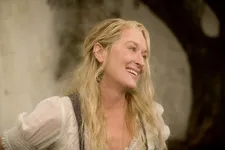 |
| Mamma Mia |
“Some of it happened very organically,” adds Dan. “I think we started off with a very simple idea that we would show a film and then get people talking about it, because people weren't talking enough about it. But I think we identified a quadrant of things that were going on. So the first thing is really simple, which is just cinema. I mean, it's the place where you can go to see a film. But then on top of that, we've got an element of education. Then there's a bit of a community, with us bringing people together. And that's a positive influence on people's mental health from the start. And then there is the public health one, which is increasingly what we’re talking about now. We're talking about mental health so that people then feel able to reach out for help, and also so we increase empathy and understanding for others as well. I mean, I think that's one of the biggest things that comes from film. You watch the film and then we’ll often ask ‘What was going on for that character? What do you think was going on in their head? What would it be like to be them?’”
Cinema doesn’t always portray people with mental health crises very well, and there are a lot of problematic issues there. Does he have any thoughts on that?
“Yeah,” he says. “It’s something we don't shy away from. I guess the first thing to say is that we will show any film across the spectrum, across genres. So our films aren't specifically looking at explicit depictions of mental illnesses. Some of them don’t have characters with any kind of diagnosis. We’re just looking at that kind of experience. It’s difficult to accurately depict a person's mental health experience. A hundred people might have the same diagnosis but then experience things very, very differently. There's no one depiction of a mental health diagnosis. And so we try to be really open about that, and maybe take each showing as an individual depiction of some of these experiences and then try and make sense of it in that respect. Film is a powerful, powerful expression. We recognise it does have power. So those are absolutely conversations that we're willing to have in the room, and we're never presenting ourselves as having the answers.”
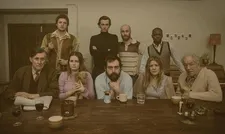 |
| Mad To Be Normal |
So how do they choose their films?
“A lot of times, it's just one of us are both of us have watched the film, and then we said to the other one ‘We need to show this,’” says Scott. “We've also encouraged people to recommend films or to come and be part of presenting the film. And we had a Twitter poll a couple of times where people could could select a particular film for us to show. We are always careful to think about what genres we’ve shown recently. We want to be inclusive for people. How do we make sure that we're not excluding people, you know, people who dislike horror, for instance? So we’ve tried to show a selection. We showed Mamma Mia at one point, we showed a bunch of kids’ films, Pinocchio and Frozen. We’ve shown sci-fi films like Star Wars, we’ve shown horrors, we've shown It's A Wonderful Life at Christmas. We try to just be really inclusive and cover kind of all genres so that there's a little bit for everyone there.”
They’re hoping that they’ll soon be able to return to doing in-person screenings, he says. It might not be one a months, but perhaps three or four bigger events. He and Dan are both full of praise for the Belmont and the support it has given them.
“I think they're actually really good at bringing in the community for projects,” says Dan. “They're really quite supportive about that. We have had maybe two or three showings there in the past that were really quite big, where we're talking, I think, a hundred plus attendees. We showed Swiss Army Man there, and then we hosted a Q&A with the director Robert Mullen when we showed Mad To Be Normal. It's a nice, small, intimate setting for having conversations about mental health”
“We also showed the Turkish film Mustang there,” adds Scott.
Do they have anything to say to people who might be interested in starting similar local initiatives?
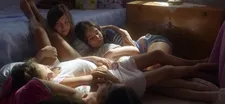 |
| Mustang |
“The main purpose of what we what we do is to encourage conversations around mental health,” says Scott. ”So I think a really positive message would be, you know, hold conversations, use film, use other elements of the arts as well, use these accessible things that people talk about all the time, as platforms for conversations about mental health or for thinking about other people's mental health and well-being experiences and taking those perspectives. I think that that would be key. What we do in terms of our in person showings served a whole bunch of functions. And one of the things that that we found that happened was that lots of people came to us after the showings with their own struggles or struggles of people close to them, that they were looking for support with, and we were able to provide a little bit of support using our knowledge of local services and you know, just kind of being able to mentalise and empathise with those people.
“Lots of people told us that that was a useful part of the initiative. And I guess that would be one potential word of caution if people are going to set something like this up. Dan and I have many years of experience as mental health nurses and therapists, that might be key in being able to provide some of that support. Where, you know, if Joe Bloggs set up something like this, something that they might find is that there are people who have problems that are maybe unresolved, that they're looking for support with. And then people might feel a little bit lost or overwhelmed.”
Dan nods. “It's a simple idea that actually comes with a degree of complexity because of the array of human beings that are going to be in the room. Everyone has very different perspectives as well as different experiences. People have differing opinions. So while it is a very, very simple idea, and we're not going to sell ourselves like superhuman experts, we do have a competence and expertise for responding sensitively to people in distress, to be quite articulate with ideas. So I think, absolutely, it would be great if more people could do this. But what we think is that it’s something that needs to be done very, very carefully.”
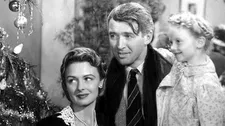 |
| It's A Wonderful Life |
If people from similar backgrounds, who do have that kind of experience, want to take it on, where would they advise them to begin with the film side of it?
“There are just some practical things that we didn't know,” says Scott. “We were fortunate working with a university. We could just ask people. We didn't know about licencing and showing the film to the public so the university took care of licencing details, you know, paying for a licence to show a film in a particular building in the uni. And then when we worked with a local cinema, obviously they needed to take care about that sort of stuff.
“For us, a lot of this stuff was just asking for good will from people, like we went and asked the catering department at the uni about providing free food and drinks, because we thought that it was important, because people were giving up their time to come to this round about tea time, that they might be hungry. And also, you know, some people might be looking after themselves. One guy actually fainted during the show, and we stopped the film. And when the guy came to, he said ‘I've just been looking after myself that well,’ and we were able then to give him some sandwiches and sugary tea. And we were also able to see that people were able just to come along and not feel guilty for taking some free treats and things if that's what they needed.
“I guess there's a whole bunch of stuff that we found out just by doing it. It's actually quite easy to find a find a venue or cinema that will work in partnership with you to show a film and have a conversation around it. It's quite simple and quite safe to do that. So yeah, just just have those conversations, just ask questions. And the worst people can say is ‘No.’”
So finally, what has each of them personally got out of doing this?
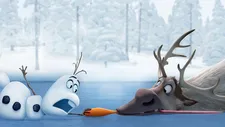 |
| Frozen Photo: Disney |
“I’m just going to have a sentimental moment with Scott here,” says Dan, “but it’s definitely brought us really, like incredibly close together, in terms of us doing this. Because we're not only facilitating conversations about it, we're also sharing a lot of ourselves as well. We are people. I opened up to Scott about my own previous history of suicidal thoughts and stuff like that. Almost as a benefit of me encouraging other people to talk about their mental health, I had the realisation that I wasn't necessarily being as open as I should be about my mental health as well. And also having built up that relationship with Scott I felt I could trust him enough to have that conversation. But again, I think, there’s an enormous sense of satisfaction in terms of doing something that for me feels quite fun, but for the people that come along with issues and experiences it has actually felt really quite important to them.”
“Opening up about mental health experiences wasn’t something that came easily to me,” says Scott. “By the time I met Dan, I was getting a bit better at that, but through the initiative I've allowed myself to be open with lots of people about similar stuff – about, you know, feeling suicidal when I was younger, all sorts of stuff that impacted my mental health. It just feels like that we we've done something that's quite important and it's touched people's lives. We’ve built a community of people, we've enabled people to take different perspectives to think about health and to think about other people's experiences. That makes me feel fuzzy inside.”
If you’d like to know more, you can check out the Mental Health in Movies podcast on Anchor or Spotify or email Dan and Scott at [email protected]. You can also find them on Facebook at @mentalhealthmovies or Twitter at @MH_in_Movies





















